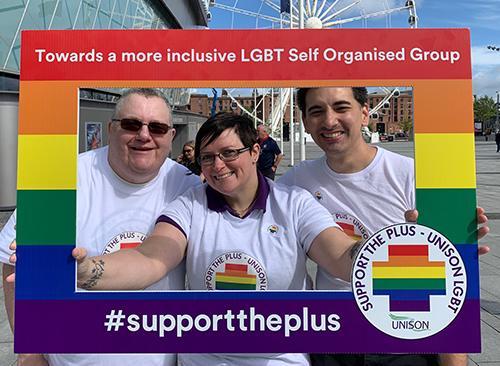If it’s Tuesday afternoon at national delegate conference, it’s time for the general secretary to take the floor.
But conference is never about one individual and in Liverpool today, Dave Prentis closed his speech by inviting dozens of members who have taken part in winning industrial action over the last 12 months to come forward.
As green and purple flew, delegates stood as one, applauding and cheering, with Liverpool anthem You’ll Never Walk Alone reverberating around the hall.
It was the perfect illustration of the solidarity that was his theme; the perfect illustration of how UNISON is helping more members achieve more than any other union in the UK.
Mr Prentis warmed up with a spot of gentle banter, apologising to Everton fans for Liverpool being the home of the “European football champions (It’s a shame I’m from Leeds)”, before touching on some of the city’s proud history.
“It was here in 1756 that the Liverpool shoemakers organised the first recorded strike. It was here in 1848 that the first trades council was formed,” he said.
“Liverpool – a city that knows the true meaning of solidarity. Like UNISON – the union with solidarity at its core.”
That, said Mr Prentis, was just like the solidarity the union has shown, and will continue to show, the Hillsborough families in their fight for justice.
The solidarity the union has shown with the people of Grenfell Tower in the two years since that calamitous firestorm – and will continue to show.
“Our solidarity has no borders,” said Mr Prentis.
Across the world, UNISON reaches out, resists, fights and never gives up, from Colombia to Turkey to Palestine.
Internationalism, he said, is the heart of our union; solidarity its bedrock.
And no more so than in the fight against the far right.
“The past year we’ve had to fight harder than ever. On the streets, but also in workplaces. Protecting our members. Fighting for their right to live free from fear, free from cheap jibes, free from racial slurs.
“Our members from the EU told to ‘go home’.”
Mr Prentis said that Brexit had unleashed “the stench of extremism … new faces spouting age-old hatreds.
“Our fight against bigotry, racism, Islamophobia and anti-Semitism can feel like an uphill struggle.
“But if we are bold, if we are strong – if we stand in solidarity, we will win” he pledged, to heartfelt applause.
It was the union’s duty to tackle the “hateful violence” of the Football Lad’s Alliance and “toxic Tommy Robinson”.
Playing it safe would bow to the wishes of the rich and powerful and the results would be dire, he warned: narrow-minded nationalism, a no-deal Brexit and Trump.
“United together, we will put the racists back in the gutter where they belong!”
To more applause, he pledged that for UNISON, the Good Friday Agreement and peace in Northern Ireland would remain paramount, with no hard border and no watering down of equality of citizenship.

Of Brexit, Mr Prentis said that, for the union’s members, “there’s no such thing as a left-wing no-deal Brexit.
To loud applause he told conference that, “for our members, no deal is a bad deal!”
“It would hammer our members, with Trump and his vulture capitalists waiting in the wings to destroy our public services.”
Since the politicians have failed, the only option left must be to take the decision back to the people, where it belongs.
Describing the Conservative leadership contest as a cross between “I’m a Nonentity, Get Me Out of Here and Britain’s Got No Talent,” he said that “what the country needs is a general election … that will sweep away this terrible government.
“Our members need a Labour government like never before: a Labour government which has the capacity to transform our country, our economy, our society.
“Yet I also have demands of Labour. I want our members to be listened to.
“Our union demands that all privatisations, all outsourcing be ended immediately when they take power.
“And I demand a year one commitment – in line with Labour Party conference policy – that all services and all our people be brought back in house.
But then Mr Prentis turned to how UNISON has become the biggest union in the UK; the fastest growing union in western Europe – an achievement founded on being a union of compassion and kindness. A union founded on solidarity.
And he concluded with celebrating what solidarity means in reality, paying tribute to striking members around the UK, from Wigan to Wrightington, Sirona to Sandwell, Camden to Calderdale, AFG to AQA, Birmingham to Bradford and on and on, before inviting some of those to join him in front of the rostrum.
Conference rose and applauded and cheered.
“UNISON – Britain’s biggest, Britain’s best – solidarity forever!”
The article For UNISON, it’s solidarity forever, pledges Dave Prentis first appeared on the UNISON National site.
from RSSMix.com Mix ID 8239598
https://www.unison.org.uk/news/article/2019/06/unison-solidarity-forever-pledges-dave-prentis/
via
IFTTT
source
https://childrensplayareadesigns.tumblr.com/post/185683815787



